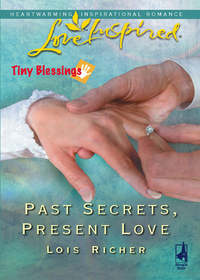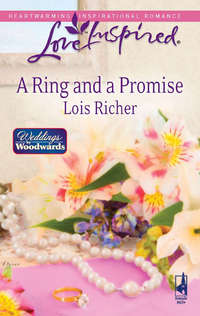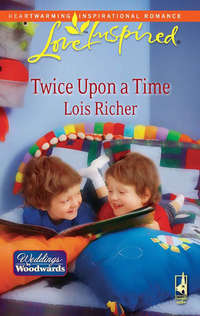
Полная версия
Faithfully Yours
“Please,” Gillian muttered, holding up one hand. “Spare me the sermon. It sounds just like something my grannie used to say.” She shifted to one side as the family behind her moved away from the table, children gaily jumping from bench to bench.
“‘When I was a child,’” she said in a scratchy voice meant to copy her grandmother’s thready tones. “‘We never had the advantages you young things have today. Why I walked three miles to and from school every single day, even when it was forty-below. In bare feet. Without a coat.’”
Mr. Nivens’s eyebrows shot up almost to his hairline as he listened to her. When at last he moved, it was to brush off the crumbs from his pant leg and remove a blob of cream Gillian had slopped on the toe of his shoe when Pastor Dave had grabbed her.
“You’re being ridiculous,” he murmured, stepping around her carefully. “No one could walk through forty-below without shoes or a coat and survive.” He started up the basement stairs after tossing one frowning look at her bright curling tendrils of hair where they lay loose against her neck.
Gillian snapped the tray down on the table and motioned to the folk holding out their cups.
“Help yourself,” she advised, with a frown on her face. “I’ve got something to say to Mr. Nivens.”
“Go for it, Missy,” Ned Brown advised, grinning like a Cheshire Cat “That feller needs a bit of loosenin’ up. Seems to me you’re just the girl to do it.”
As she raced up the stairs, Gillian decided Ned was right. She had a whole year of Mr. Jeremy Nivens to get through. She might as well start off as she meant to go on.
He was striding across the parking lot when she emerged—huge, measured strides that made her race to catch up. Fortunately, she wore her most comfortable sandals and could easily run to catch up.
“Just a minute, Mr. Nivens,” she called breathlessly. “I have something I want to say.”
He stopped and turned to stare at her, the wind ruffling his dark brown hair out of its usual orderly state. One lock of mussed hair tumbled down across his straight forehead, making him seem more human, more approachable, Gillian decided.
“I was making a joke,” she said finally, aware that his searching gray-blue eyes had noted her flushed face and untucked shirt. “It was supposed to be funny.”
“Oh.” He continued to peer at her through the gloom, and Gillian moistened her lips. It was the kind of stare that made her nervous, and she shifted from one foot to the other uneasily. “Was that everything, Miss Langford?”
“My name is Gillian,” she told him shortly, frustrated by the cool, distant frigidity his arrogant demeanor projected. “Or Gilly if you prefer.”
“It sounds like a name for a little girl,” he told her solemnly, his dour look suggesting that she take the information to heart. “At any rate, I barely know you. We are co-workers in a strictly professional capacity. I hardly think we should be on a first-name basis.”
“Look, Mr. Nivens,” she exhorted. “I’m trying to be friendly. That’s the way people in Mossbank are, friendly and on a first-name basis. No one at school uses titles except in front of the children.” She drew a breath of cool, evening air and counted to ten. “If you don’t want to help with the youth group, fine. But don’t pretend it’s because they’re too uncivilized for you to be around.” Her eyes moved over his three-piece suit with derision.
“I doubt you and they would have anything in common, anyway,” she muttered. “You’re far too old for them.”
His stern, rigid face cracked a mirthless smile.
“Not so old,” he said sternly. “I was a teenager once, also, Miss Langford.”
“Really?” Gillian stared at him disbelievingly.
“I’m sure of it.” His eyes sparkled at some inner joke as he watched her.
“Well, anyway—” she shrugged “—if you don’t want to work with them, just say so.”
“I thought I had,” he murmured so softly she barely caught the words. He studied her face. “Are you going to fall in with Pastor Dave’s suggestions?” he demanded.
“I think I might,” she mused, deliberately ignoring that inner voice that quietly but firmly whispered NO. “They really need some direction, and there doesn’t seem to be anyone else.” All around them the rustle of wind through the drying leaves and the giggles of children romping in the playground carried in the night air. The musky odor of cranberries decaying in the nearby woods wafted pungently toward them on a light breeze.
“But you’re not that much younger than I am,” he objected.
“In some ways,” she said through gritted teeth. “You and I are light-years apart.”
“I suppose that’s true,” he admitted at last. He turned to leave. “Good night, Miss Lang—Gillian.”
As he walked away into the dusky night, Gillian stood with her mouth hanging open. For the first time in over a month, he’d called her by her first name. How strange! Perhaps the man really wasn’t as stuffy as she’d thought. Maybe, just maybe, he’d unbend with time.
Then she frowned.
He hadn’t outright refused to attend the organizational meeting, had he? Did that mean he intended to show up and offer his staid opinions?
“No way,” she muttered angrily. “I don’t care how much they need helpers. Mr. Jeremy Nivens is not going to work in the youth group, not if I have anything to say about it.”
As she turned to go back inside, Gillian tried to ignore the sight of Jeremy almost lost in the shadows up ahead, children racing along beside him, chattering eagerly as he ignored them.
She had not misread the situation. He wasn’t the youth leader type. Not at all.
Was he?
Chapter Two
“Why are there two whole shelves of dog food and only one teensy section with tea?” Charity Flowerday muttered, as she hobbled up and down the aisles of Mossbank’s largest grocery store, searching for the ingredients she needed for lunch with her friends. Although why she should have to search for anything was a mystery. She’d lived in this small farming community for almost seventy years. She should know where every single item was kept, she chuckled to herself.
“Ah, tea.” She ran her finger along the shelf and plucked a package into her cart. “Now, dessert.”
It was impossible to ignore the young tow-headed boy in the junk-food aisle across from frozen foods. He looked much the way her own son had thirty years ago: freckle-faced, grubby, with a tear in both knees of his filthy jeans and his shirttail hanging out.
“School not started yet?” she asked in her usual friendly fashion. It wasn’t that she didn’t know. Why, her friend Hope’s niece had been teaching at the local elementary school for almost a month now, and she was well acquainted with the schedule.
“Buyin’ somethin’ fer my mom,” he muttered, turning his face away and hunching over to peer at the varieties of potato chips currently available. It was obvious that he wasn’t interested in carrying on a conversation. Charity shrugged before turning away to squint at the ice cream labels behind the frosted glass doors.
“Hmm, all pretty high in fat and cholesterol,” she murmured to herself. Heaven knew women of her age couldn’t afford either one, she thought grimly. “Arthur,” she called loudly, hoping the proprietor would hear her above the roar of the semi truck unloading outside.
When Art Johnson didn’t immediately appear, she shuffled over to the counter to wait for him. The grubby little boy was there ahead of her clutching a fistful of penny candy.
“Hello again, young man. I don’t think I’ve seen you around before. Has your family just moved to Mossbank?” Any newcomer to their fair town was a source of interest for Charity, and she couldn’t help the bristle of curiosity that ran through her. “What’s your name?”
“Roddy. Roddy Green.”
“Well, nice to meet you, Roddy. My name is Mrs. Flowerday. I live at the end of Maple Street in that red brick house. Perhaps you’ve noticed it?”
“Nope.”
Evidently young Mr. Green didn’t care to know, either, thought Charity with a tiny smile. Kids nowadays were so different. They didn’t bother with all the folderol of petty politeness and such. They just got down to the basics.
“Where’s the old guy that runs this place?” the boy demanded sullenly, tapping his fingers on the counter. “I haven’t got all day.”
“Oh, Mr. Johnson often has to stay at the back while they unload the truck,” she explained to him with a smile. “He counts the pieces as they take them off to be sure he receives everything he should. I’m certain he will be here in a moment.”
“I’m here right now, Charity. Sorry to have kept you waiting. What can I do for you?”
Arthur Johnson smiled at her the same way he had for the past thirty-five years, and Charity smiled back. He had always been a friendly man who took pleasure in meeting the needs of his customers. When he looked at her like that, his face jovial, his balding head burnished in the autumn sun shining through the window, Charity felt her heart give a quick little patter. He was still such a handsome man.
“I was here first,” Roddy piped up belligerently. He smacked the candy on the counter. “How much?”
Charity noticed Art’s eyebrows rise at the obvious discourtesy, but she shook her head slightly.
“Yes, he was here first, Art,” Charity murmured.
“All right, then. Twenty-nine cents, please, young man.”
As Charity watched the child’s hand slip into his pocket for the change, she noticed his other hand snitch a chocolate bar from the stand in front of him and slip it into his other pocket She motioned her head downward as Art glanced at her, but this time it was he who shook his head.
“Thanks, son. Now you’d better get back to school.”
“’Bye Art the fart,” the boy chanted, racing out the door and down the street. They could hear his bellows of laughter ricochet back and forth along the narrow avenue.
“Of all the nerve! Arthur Johnson, you know very well that child stole a chocolate bar from you,” Charity accused, casting the grocer a black look. “Why did you let the little hoodlum get away with it? Didn’t you see it clearly enough?”
“Oh, I saw it, Charity. My eyes are still pretty good, and that mirror really helps,” Art chuckled. “But this isn’t the first time I chose to do nothing about it. Not right now. Anyway, that chocolate bar will eat away at his conscience all afternoon. He’s not getting away with anything.” He pressed her shoulder gently as if to soothe away her indignation. “Now, dear lady, what can I do for my best customer?”
Charity preened a little at the complimentary tone, straightening her shoulders as she blinked up at him girlishly.
“Well, Arthur, I’m having guests for lunch today, and I want to serve ice cream. This may be one of the last really warm days we have this fall, you know.”
“I see.” Art led the way over to the freezers and tugged out a small round tub. “I have your favorite right back here, Charity. Double chocolate fudge pecan.” He beamed down at her
“Why, I can’t believe you remembered. It’s ages since I had this. It won’t do for Hope, though,” Charity said, grimacing. “She’s always watching her fat content, and this is bound to send it over the moon.” A tinge of frustration edged her words as she shoved the container back into the freezer. “Maybe we’d better have sherbet instead. A nice savory lemon.”
“Charity, Hope Langford is so scrawny she could do with a little fattening up. Besides, you know you love chocolate. And this is the light variety with one-third less fat It’s really quite delicious.” Art glanced at his hands self-consciously. “I tried it myself last week.”
“You ate chocolate ice cream, with your cholesterol level?” Charity frowned severely. “You need a woman to look after you, Arthur.”
They spent twenty minutes discussing their various health ailments before Charity strolled out the door carrying the container of chocolate ice cream and grinning from ear to ear.
Two and a half hours later Charity was welcoming her two friends to her cosy home and a scrumptious lunch.
“Isn’t it lovely out today.” That was her friend Faith Rempel who simply never had a bad day. “I can’t imagine more perfect weather for walking.”
“I thought Jeremy didn’t like you walking all over town,” Hope Langford questioned. “Has he changed his mind?” Hope’s voice was soft and shy, much like the woman herself. At fifty-six, she was the youngest in their group and much concerned over her friend’s propensity to accidents. She had, at first, greeted the arrival of Faith’s nephew, Jeremy Nivens, with relief.
“Oh, Jeremy’s far too busy with school just now. He’s trying so hard to make a good impression with this first principalship. The dear boy hasn’t been hovering nearly as much this week.” Faith brushed the permed lock of gray hair off her forehead absently as she stared at the other two. “I haven’t seen him for three days,” she told them cheerfully. “Or was it four? Let’s see now…”
Charity laughed gaily.
“Oh, Faith,” she murmured, leading them out to her small patio and the gaily set table. “Don’t tell me you’ve forgotten what day it is again? I declare that memory of yours is—”
“Just fine,” cut in Hope quietly. She frowned at Charity. “I think she does wonderfully well. And if we’re talking about Jeremy, I don’t think Gillian is particularly impressed with him. She says he’s very old-fashioned.”
They sat around the table, munching on the low-fat ham sandwiches and crunchy green salad as they discussed the newest educators at the local elementary school.
“Well,” Charity murmured. “You must admit your niece is very advanced in some of her ideas. Why, just the other day I heard Gillian complaining about the textbooks. Said they were too passé to be any good!” Her white eyebrows rose with indignation. “We’ve had those textbooks for years, as you well know, Hope Langford.”
Hope hid her smile behind her napkin. Her voice, when she finally spoke, was the same soft tones they had come to expect from her. “Yes, I know the age of some of those books very well. I myself tried to have them replaced just before I retired from teaching. Unfortunately, some folk in the community felt they were adequate, so the money was not forthcoming.” Her blue eyes sparkled with mirth at Charity as she smoothed a hand over her blond, chin-length bob. As usual, there wasn’t a hair out of place.
“I can’t imagine why anyone thinks the children of the nineties still need to focus so completely on President Kennedy’s administration,” Hope murmured. “Several things have happened since the early sixties, Charity.”
“Oh, piffle.” Faith stared at them vacantly for several moments, her brow furrowed. Her English accent became more pronounced as she spoke. “I’ve forgotten whatever it was we were going to discuss today.”
“It’s all right, dear,” Hope whispered, squeezing the other woman’s hand gently. “We were going to discuss our Christmas project. Isn’t that right, Charity?” She glanced across the table warningly, her thin body rigid in her chair.
“Yes, indeed,” Charity murmured gaily. “But not before we’ve had my special dessert.” She rose to stand behind Faith’s chair, her tiny frame hidden by the larger woman. “And of course, we’ll have tea. You pour, dear.” She squeezed the rounded shoulders affectionately.
It was difficult to scoop out the ice cream with her arthritic hands, so Charity took the carton and dishes to Hope for help. They both watched as Faith’s faded green eyes lit up with excitement as she tasted her first spoonful.
“Nuts,” she crowed. “This ice cream has nuts.” She sighed with pleasure. “I do love nuts,” she murmured happily.
As they basked in the warm, afternoon sun, sipping tea, chatting desultorily and ignoring the dirty dishes sitting nearby, Charity held her hands out for them to see.
“I’m afraid I won’t be able to quilt this year, girls,” she murmured, staring at her gnarled fingers and twisted knuckles. “I just can’t manage the needle anymore.”
They were aghast.
“But, Charity,” Faith exploded. “You’ve always made a special Christmas quilt every year for as long as I’ve known you. It’s a tradition in Mossbank.” Her eyes were huge and filling rapidly with tears. “You can’t just give up.”
“Well, this year I am choosing something else for my Christmas project.” Charity’s brown eyes sparkled with a secret.
Hope cleared her voice, curiosity widening her china blue eyes. “What?” she enquired softly.
“I’ve been praying about it, and this morning I got an answer. I’m going to take on a different kind of project—a person. A little boy named Roddy Green. I watched him steal a chocolate bar at the grocery store this morning when he should have been in school.” Charity shifted her feet to rest on a nearby rock, exposing her puffy, swollen ankles. “And I decided he could use a friend,” she murmured quietly. “Art told me a little about the boy, and I think we could both benefit from the relationship.”
“I don’t like that word,” Faith told them both, absently pulling a weed from the huge pot of yellow begonias that sat nearby. “It’s what Jeremy always talks about when I ask if he has a special girlfriend he’s interested in.”
“What word is that, dear?” Hope asked mildly confused.
“Relationship. My Donald and I never had a relationship, not once in thirty-five years. We had love and friendship and care and concern and sometimes arguments, but we never had anything as cold as a relationship.” Faith spat the word out with disgust.
“Young people today do have a different way of looking at things,” Hope agreed. Her blond brows drew together as she asked curiously, “And does Jeremy have a relationship with someone?”
Charity watched Hope twist her fingers together as she lounged in her chair. It was that unusual activity that gave the younger woman away, she decided. Hope never fidgeted. Charity wondered what her friend was up to.
“No,” Faith answered the question sadly. “Jeremy says he’s far too involved in his career to bother with females right now. He really wants to make a success of this school year.” Her face drooped as she told them about her great-nephew’s visit two or three nights before. “He was most uncomplimentary about my natural garden. Said it resembled a weed patch more than a flower garden. He even pulled up a few of my special species.”
“He would.” Hope’s tones were dry. “He’s got his nose buried so far into his policy-and-procedure manuals he can’t see real people in front of him. Jeremy Nivens needs to realize that life is about more than school and books.”
“He doesn’t like me to have the fireplace going, either,” Faith told them solemnly. “He said I’m liable to kill myself with it.”
“It’s gas,” Hope cried. “It shuts itself off. What in the world is he so concerned about?”
Faith shrugged her shoulders tiredly, a wan smile curving her full lips.
“Jeremy worries about me, my dears. He’s much like his father was, always fussing about things.”
“Well,” Hope drawled, staring thoughtfully up at the deep blue sky, “I think he needs something else to engage his mind. Something slightly more challenging ”
“What are you up to?” Charity demanded finally. “Don’t bother to deny it, I can see that glint sparkling in your eyes.”
“Oh, tell me, too.” Faith clapped her hands in glee. “I love it when you have a plan, Hope. It’s always so wonderfully organized, just like you.”
Hope smiled a peculiarly smug grin as her eyes moved from one to the other.
“You have to promise not to say a word,” she said seriously. “Not a whisper to anyone. If this gets around, he’ll never forgive me.”
“Who?” Charity demanded irritably.
“Jeremy,” Hope told them proudly. “I’ve decided to make Jeremy my Christmas project. I’m going to find him a wife so he’ll be too busy to bother Faith anymore.”
Her two friends sat in their lawn chairs, mouths gaping as they absorbed her news. The birds happily chirped around them as a neighbor’s lawn mower hummed industriously.
“You mean,” Charity asked, “you’re going to throw him and Gillian together? I don’t think—”
“Of course not,” Hope said, cutting her off. “Gillian is a free spirit. She needs a man who can understand that, and not try to fence her in with a lot of silly restrictions. Besides, Jeremy’s too old for her.”
“Oh, piffle. Jeremy’s not that much older than your Gillian,” Faith chided, her eyes sparkling at the thought of her great-nephew married.
“In his approach to life in this century, Jeremy rivals Moses,” Hope muttered dourly. “I was actually thinking of Letitia Chamberlain. She’s a quiet little thing, and she’d do whatever he told her to.”
“Well,” Charity murmured, staring off into space, “I suppose if you’ve made up your mind, there’s no point in me trying to change it. I do think it’s too bad not to continue with your knitting though, Hope. Those mittens you donate are really needed in the cities. Why, I heard the mayor of Minot on the news the other day. He said they would need at least a hundred pairs in the schools this year!”
Hope smiled. “Oh, I’ll still be knitting,” she murmured. “And while I am, I can think of new plans for Jeremy.” Charity watched the glint of mischievousness sparkle in her friend’s eyes and wondered what she was up to.
“It isn’t fair,” Faith wailed sadly. “You have both chosen your projects, and I don’t have one. What shall I choose? I’m not very good at matchmaking but maybe I could try for Gillian.”
Charity met Hope’s wary glance with her own.
“No!” They both said it together.
“What we mean, dear, is that you’re such a good cook and you always do those wonderful dainty trays for the Christmas hampers. Maybe you should do that again.” Charity nodded as Hope’s soft voice soothed their friend.
“Of course I will continue with that,” Faith told them firmly. “But I want a special project. Something really different.” Her green eyes narrowed as she pondered the subject. Finally she stood to her feet.
“After all, I do have a bit of time yet. It is only the first week of October, isn’t it? I shall think and pray about it. Perhaps the good Lord has some special work that I can do.” Faith ambled out the front door, completely forgetting her purse and sweater as she strolled along, mumbling to herself.
“We should have thought of something for her to do, before we announced our ideas,” Charity muttered, gathering up their teacups and setting them on the tray. “It’s not fair to leave her like that.”
Hope carried the dishes back into the house and set about washing them carefully in the old-fashioned sink. She had most of the work done before Charity hobbled in.
“Faith is a strong, competent woman,” she stated firmly. “She’s not senile, just a little confused sometimes. I think it will be good for her to think about a Christmas project rather than Jeremy’s odious meddling, for a while.” Hope shook her head with disgust. “That man would drive a saint up the wall.”
“He’s certainly been hovering around Faith since he came,” Charity agreed. “I heard him telling her not to use the oven unless he was there. You know how she loves to bake. I can’t imagine that she’ll listen to him.”
“It might be best if she did,” Hope muttered finally. “I hate to say it, but her memory is getting worse. I’ve been checking up on her myself lately, just to make sure she gets home safely.”
“Funny,” Charity mused absently, rubbing liniment on the aching joints of her hands. “Arthur mentioned something about seeing her home the other night. Said he found her in the park, gathering leaves for her collection. In the dark.”
“Well, I think we’ll just have to be especially careful to keep track of her with Jeremy around,” Hope said with a frown. “I don’t like the way he keeps telling her not to do this or that, fussing if she goes for a long walk. She’s not in prison, for heaven’s sake.”
“Yes, I’ll watch her, too,” Charity agreed, sinking into her easy chair. “Now about this project of yours? Do you really think you can find someone suitable for him? He’s rather, er, old-fashioned, dear.”








